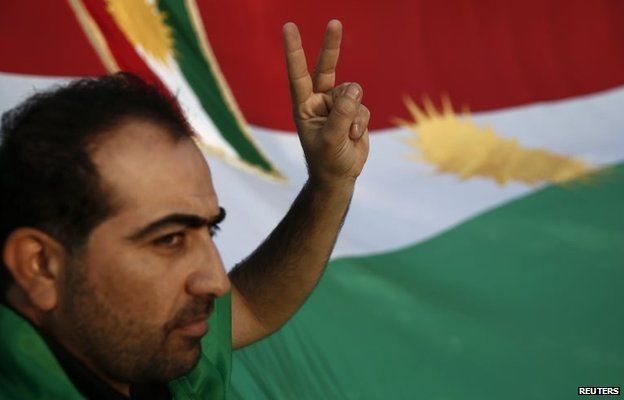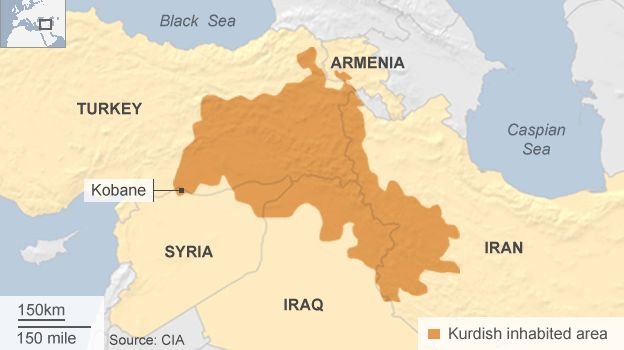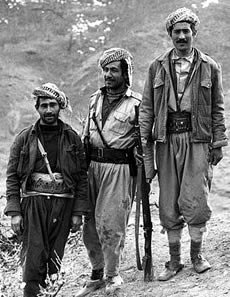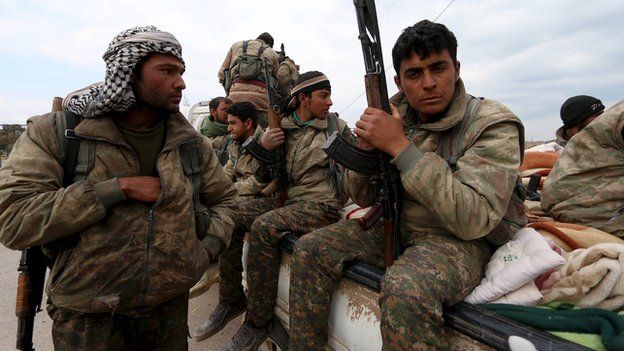
Picture courtesy of Jeffrey Pentel (Reuters)
The Kurds were most likely an Indo-European people who migrated from Central Asia to Asia Minor and northern Mesopotamian regions, living among Assyrian and Babylonian inhabitants sometime between the second and first millennium b.c.e. For centuries the Kurds maintained their own civilization, establishing a number of kingdoms and tribal fiefdoms in the high mountain areas in the Iran-Mesopotamia regions.
The modern Kurdish people are the descendants of the original Kurds who were living in the Zagros Mountains and northern Mesopotamia, and they now populate territories known as Kurdistan, regions stretching from northwestern Iran to southeastern Turkey, northern Iraq, and northeastern Syria. Kurdish tribes can also be found in other countries such as Armenia, Azerbaijan, Georgia, and Lebanon.

Kurds are the fourth-largest ethnic population living in southwest Asia. Most sources indicate that today there are more than 30 million Kurds. Kurdish societal structure remains tribal, with loyalty of each Kurdish group directed toward an immediate family clan, but many modern Kurds now live in large cities. They do share a common cultural heritage that goes beyond their tribal social structure. The distinct Kurdish language belongs to the Iranian subgroup of the Indo-European languages.
The Kurds are mainly Sunni Muslims of the Shafi’i theological school of thought, which places more emphasis on the consensus of the community than on the authority of individual clerical scholars as a source of interpreting Islamic law. Many Kurds in Iraq, Iran, and Turkey also adhere to Sufism, or the mystical branch of Islam.
Kurdish Islam evolved into a distinct form of vernacular religion with unique Kurdish cultural characteristics. A minority of Kurds are also Shi’i Muslims, Smaller Baha’i, and Christian; Jewish communities can also be found among the Kurdish population, with the Jewish Kurds mainly living in Israel.
The modern political history of the Kurds has been a quest for national autonomy. Although the 19th century saw a number of rebellions, Kurdish nationalism made its first appearance with the 1880 revolt of the Kurdish League, led by the charismatic Sheikh ‘Ubaydallah of Nehri.

Despite defeat by the Ottomans, Sheikh ‘Ubaydallah’s movement marked the first Kurdish national rebellion that included Kurds of the Ottoman Empire and Qajar Persia. With the rise of the Young Turks Revolution in 1908, which removed the rule of ‘Abdulhamid and restored the 1887 constitution, the Kurds began to form their own political parties.
Following the demise of the Ottoman Empire, on August 10, 1920, Britain, France, and Italy designed the Treaty of Sèvres, which officially recognized Kurdish claims for national autonomy and an independent Kurdistan. The treaty was signed by the Allies and Turkey, recognizing that the Kurds have the right to exercise local autonomy.
Following the signing of the Lausanne Treaty in 1923, which mainly settled the boundaries between Armenia, Greece, and Turkey, the newly founded Atatürk government rejected the Treaty of Sèvres and subsequently found an opportunity to suppress the Kurdish right for national independence.
The Kurds revolted against the Turkish state in 1925, 1930, and 1937, all three revolts led by Sheikh Sa‘id and Sayyid Reza of Dersim, and all three brutally defeated. After that, all Kurdish nationalist movements experienced the same fate.
A recent liberation movement for national autonomy was led by the Kurdish Worker’s Party, or Partyiya Karkeren Kurdistan (PKK). The Marxist nationalist party was founded in 1973 and toward the end of the 1970s expanded its influence in the Kurdish regions of Turkey by using guerrilla warfare and terrorism as a way to destabilize the Turkish authority.

The PKK proved to be the most violent of all Kurdish political groups in the modern history of Turkish nationalism. In return the Turkish army used various violent means to put down the Kurdish rebellion.
These included the arbitrary murder and detention of Kurdish civilians, and the repression of Kurdish thinkers, journalists, and businessmen. The PKK lost much of its strength with the 1999 capture of the organization’s leader, Abullah Ocalan. On August 2004 the party declared a unilateral cease-fire.
The struggle for Kurdish nationalism, however, was most fruitful in Iraq. From 1919 to 1945 all the Kurdish rebellions against the British Army and the Iraqi regime were ruthlessly crushed. The Barzani family played a central role in these rebellions.
Mustafa Barzani’s Kurdistan Democratic Party (KDP) led the struggle when, on July 14, 1958, the monarchy was overthrown by General Abdul Karim Qassim. The republican coup raised the Kurdish expectation for more equal participation in the Iraqi state.
But Qasim’s regime quickly discarded Barzani’s call for Kurdish independence, and in 1961 he renewed fighting with the Kurds. From 1961 to 1963 and from 1974 to 1975, Mustafa Barzani led an armed struggle. Later in the 1970s Barzani went into exile in the United States, where he died in 1979.
In 1979 Masoud Barzani succeeded his father to lead the KDP. With the help of thousands of armed fighters, the peshmargan, he gained control of major parts of northern Iraq.
After the First Gulf War the KDP emerged as one of the most significant Kurdish political organizations, operating with relative freedom to govern sections of northern Iraq while achieving the first enduring semiautonomous Kurdish state in history. In the early 21st century Barzani continued to play a major role in Kurdish politics in Iraq, where he shared power with his Kurdish rival Jalal Talabani.
Talabani was a major Kurdish nationalist and the leader of the Patriotic Union of Kurdistan (PUK), which was established in 1975. Formed mainly by urban intellectuals and leftist thinkers, the PUK emerged as KDP’s main political competitor.
In the early 1990s he helped the Kurdish uprising against the Ba’athist state while working closely with the United States, the United Kingdom, and France to establish the no-fly zone over northern Iraq to protect the Kurds from bombing and chemical attacks by Saddam Hussein’s army.
After years of rivalry, the PUK joined forces with the KDP and other Kurdish parties to create the Democratic Patriotic Alliance of Kurdistan to represent the Kurds in the Iraqi National Assembly elections of 2005 and 2006. In post-Ba’athist Iraq, Talabani was named the president of Iraq on April 6, 2005, and again on April 22, 2006, by the Iraqi National Assembly.
The Democratic Patriotic Alliance co-operated with the US-led invasion of Iraq in 2003 that toppled Saddam Hussein and have participated in all national governments formed since then.
After IS captured large parts of northern Iraq in 2014, the KRG sent the Peshmerga into disputed areas claimed by the Kurds and the central government, and then asked the Kurdish parliament to plan a referendum on independence. In February 2016, Massoud Barzani - who became president of Kurdistan in 2005 - reiterated the call for a referendum. However, he stressed that it would be non-binding and would simply allow Kurdish leaders to "execute the will of the people at the appropriate time and conditions".

Picture courtesy of Jeffrey Pentel (Reuters)